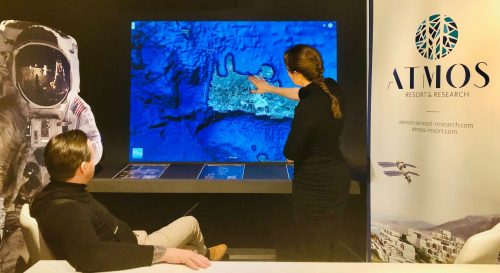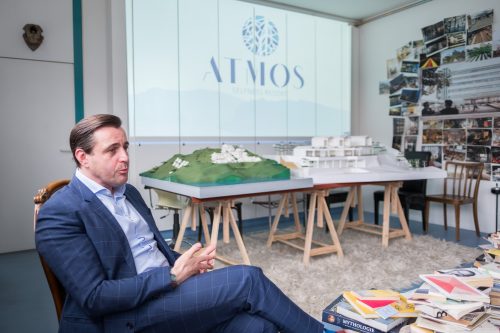ATMOS Resort & Research: Corona Crisis fuels the search for the best air quality
Corona Crisis fuels the search for the best air quality
The Covid-19 pandemic confirms research approach of ATMOS Aerosol Research: using cutting-edge technology to measure air quality and the ‘breathing’ architecture of Coop Himmelb(l)au in order to improve prevention and the recovery of patients with respiratory diseases. Real-time data and monitoring systems will allow people to see what kind of air they are moving in and to find places for recovery – also for people recovering from coronavirus disease.

Analyses of the development of the coronavirus pandemic show that severe progressions of the disease COVID-19 are more frequent in regions with heavily polluted air. For several years ATMOS Aerosol Research has been researching the links between air quality and health. Precise air quality data, provided the company, create the basis of decison-making when it comes to ecologically responsible actions in politics, administration and economy. Products and services offered make the collected data available to end users. Together with the world-renowned architectural studio Coop Himmelb(l)au, ATMOS Aerosol Research is working on the realisation of so-called ATMOS Selfness Resorts: sensing and breathing places for prevention and recovery, specially designed for people suffering from respiratory diseases and the effects of breathing polluted air.
“The coronavirus pandemic proves in a frightening way that our concept of air resorts is highly topical and relevant. For the past three years we have been focussing our efforts on analysing and optimising the air we breathe in the most diverse parts of the world. We have been doing this together with Coop Himmelb(l)au and international experts,” says Chris Müller. The CEO of ATMOS Aerosol Research fears a deadly link between fine dust particles and the virus SARS-CoV-2. Lungs that already show signs of inflammation are less resilient, which could explain the more severe progression of coronavirus disease. Furthermore, there are indications that the virus uses fine dust particles as a means of transport.
Responsibility for future generations
The results of the research around Covid-19 have drawn new attention to the link between air quality and respiratory diseases. At present, five of the three most frequent causes of death affect the lungs (lung cancer, pneumonia and COPD), 91 percent of the world population already live in harmful air according to the WHO, an hour’s walk along London’s Oxford Street causes inflammation values in the lungs to rise, and each year 4.2 million deaths worldwide are attributed to fine dust. “The death toll of the coronavirus pandemic correlates alarmingly with the pollution of the air, mainly caused by human activities. It is up to us to make sure that we don’t suffocate future generations by our failure to act.”

Better air thanks to satellite measurements
Identifying places of health-promoting air quality and implementing real-time monitoring that records negative as well as positive air quality trends around the globe, these objectives are at the core of ATMOS Aerosol Research. The basis for this are the worldwide most accurate aerosol measurements. With the help of satellites, ground measuring stations and sensors, it is possible to identify the tiniest particles, such as dust, sand, soot etc. in the air, as well as saltwater droplets, which have a positive effect on the human organism. Satellite data can also be used to retrace past events and visualise future trends.
ATMOScooter: Mobile measuring station with real-time data collection
The youngest offspring of ATMOS-research is the ATMOScooter. The electric scooter, equipped with specific sensors, measures the ambient air quality in real time and evaluates the data immediately. The air quality is shown on an illuminated display. The collected data is integrated in the ATMOS app, which records the scooter rider’s individual journeys. ATMOS Aerosol Research aims to merge this information with a global Big Picture – satellite data from NASA, ESA and other space agencies – as well as with ground measuring stations and sensors on buildings. This will create a comprehensive picture of particles, pollutants and also health-promoting elements in our air. Furthermore, medical research benefits directly from the ATMOScooter. For each kilometre travelled with this non-polluting vehicle, a donation will be made to support research into cystic fibrosis and also to provide direct aid. Once ready for series production, the ATMOScooter will be launched in several cities and also be available in the ATMOS Selfness Resorts.

© Ines Thomsen
From fighting for a daughter’s life to a holistic alliance against shortness of breath
Together with Wolf D. Prix, CEO & Design Principal of Coop Himmelb(l)au, Chris Müller presented the concept of the ATMOS Selfness Resorts three years ago. These resorts are designed as large-scale inhalers and ideal places for recovery for people with respiratory diseases, at the same time they serve as related research centres. Chris Müller himself is the father of a daughter who suffers from an incurable (as of yet) genetic defect: Cystic fibrosis (CF) causes organs to become clogged with mucus and mainly affects the lungs. Within a few months, the fight against the daughter’s disease developed into an interdisciplinary effort – assisted by a medical advisory board – to counter the worldwide spread of shortness of breath. Not only patients with CF and COPD will profit from this alliance, but also people who have recovered from COVID-19 will benefit as their weakened lungs will regain new breathing strength in the resorts. Additionally, the ATMOS Selfness Resorts will be open to all those who need breathing space and want to enjoy a holiday in the best air.
Austria – Mediterranean region – China
Parts of the ATMOS Selfness concept have already been applied to large-scale construction projects planned by Coop Himmelb(l)au, such as the “Science & Technology Museum” in Xingtai. The metropolitan city with 7.3 million inhabitants is one of the most polluted cities in China. Continuous research at the intersection of architecture, urban planning, technology and medicine has lead to comprehensive know-how, which is now incorporated into solutions needed all over the world. This is also confirmed by Wolf D. Prix with regard to “sensing” high-tech buildings that promote the health of their visitors.

© Coop Himmelb(l)au
ATMOS Aerosol Research is located in Linz, the capital of Upper Austria, and will soon operate a test area in the “Tabakfabrik” (a hub for innovative companies) there. In Vienna the housing project “Triiiple” of the SORAVIA group is the first large-scale construction project in Austria to be equipped with the air data analysis technology of ATMOS Aerosol Research. Erwin Soravia saw the potential of the ATMOS Selfness Resort and ATMOS Aerosol Research early on and has supported the development considerably: “We think globally, sustainably and literally in a 360-degree approach that reaches into space. The research on aerosols completes this holistic overall approach, which both, ATMOS and SORAVIA, claim for themselves and which we will also incorporate in our construction projects in future. In doing so we want to demonstrate greater responsibility in order to protect air as a resource,” explains Erwin Soravia.
Together with SORAVIA, ATMOS Aerosol Research is currently in negotiations with property owners in the Mediterranean, to move forward with the realisation of the first ATMOS Selfness Resorts. Contracts are expected to be signed before the end of 2020.





